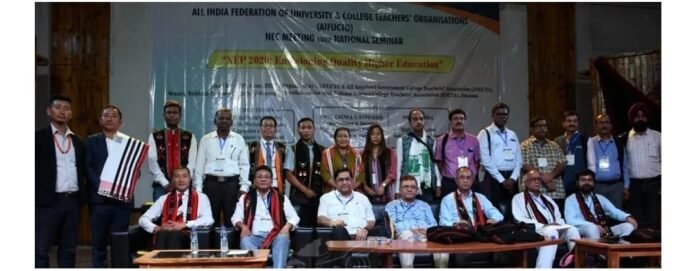In a recent development, the president of the All India Federation of University and College Teacher Organisations (AIFUCTO) has voiced deep concerns regarding the National Education Policy (NEP) 2020. Addressing educators and stakeholders in Dimapur, Nagaland, the president highlighted what they perceive as fundamental flaws within the policy.
The NEP 2020, introduced by the Government of India, seeks to revolutionize the country’s education system, encompassing various domains such as early childhood education, school education, higher education, vocational training, and teacher development. However, the president of AIFUCTO has raised specific points of contention, shedding light on potential shortcomings that demand attention.
One of the key concerns emphasized by the president revolves around the balance between centralization and decentralization within the NEP. They argue that the policy leans heavily towards centralization, potentially compromising the autonomy of states and educational institutions. This imbalance, if left unaddressed, could hinder the implementation of the policy’s objectives at the local level.
Another critical issue raised by the president pertains to the language policy outlined in the NEP 2020. While the policy promotes a three-language formula, the president expressed apprehension regarding the potential marginalization of regional languages. They underscored the importance of preserving linguistic and cultural diversity, cautioning against any adverse impacts on regional identities.
In terms of implementation challenges, the president highlighted the need for robust infrastructure, well-trained educators, and adequate financial resources. They argued that the proposed changes within the NEP 2020 require meticulous planning and investment to ensure effective execution. Without addressing these implementation hurdles, the envisioned transformation of the education system may remain elusive.
The examination and assessment system also drew attention from the president. Expressing reservations, they raised concerns about the potential impact of reducing board exams and placing greater emphasis on continuous evaluation. Critics argue that such changes could inadvertently compromise the quality and rigor of evaluation processes, warranting a careful reevaluation of the proposed alterations.
Furthermore, the president emphasized the critical issue of equity and access in education. While the NEP 2020 aims to promote inclusivity and bridge existing disparities, concerns were raised about whether the policy adequately addresses the educational needs of marginalized communities and remote regions. This aspect warrants a more comprehensive examination to ensure equitable opportunities for all.
It is crucial to note that these concerns raised by the president of AIFUCTO reflect their assessment of the NEP 2020. Their perspective adds to the ongoing debate surrounding the policy, necessitating further deliberation and dialogue between policymakers, educators, and stakeholders to address the identified flaws and work towards an inclusive and effective education system for all.



